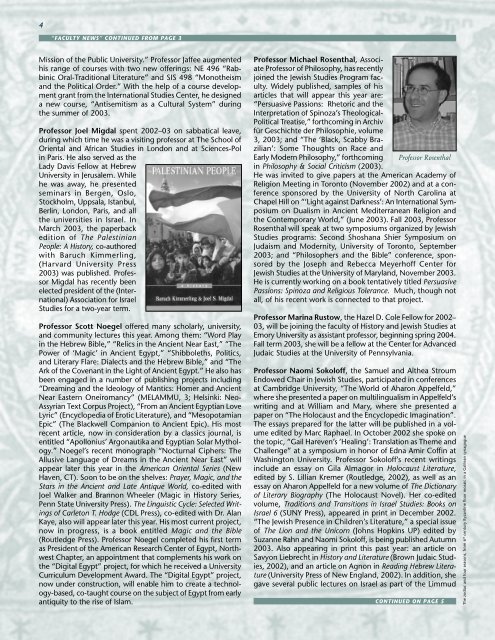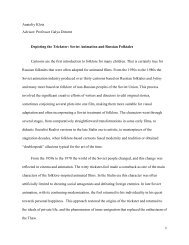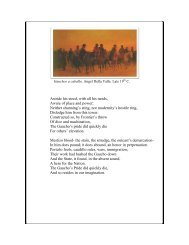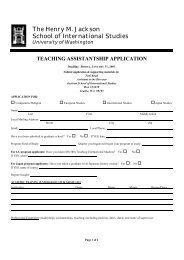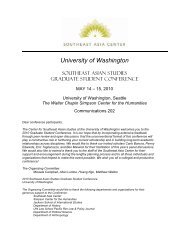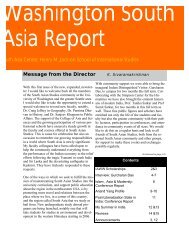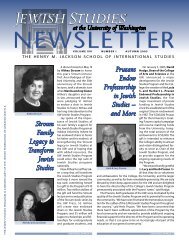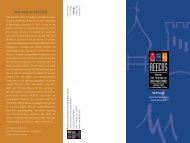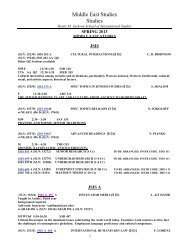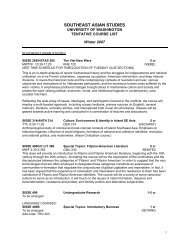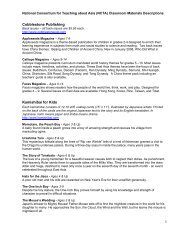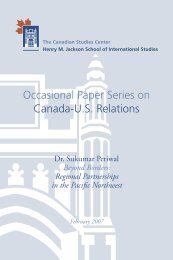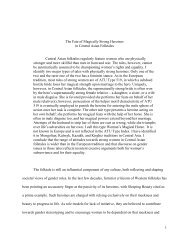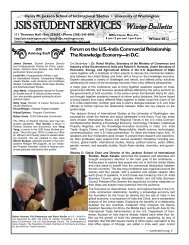jewish studies jewish studies - Jackson School of International ...
jewish studies jewish studies - Jackson School of International ...
jewish studies jewish studies - Jackson School of International ...
Create successful ePaper yourself
Turn your PDF publications into a flip-book with our unique Google optimized e-Paper software.
4<br />
“FACULTY NEWS” CONTINUED FROM PAGE 3<br />
Mission <strong>of</strong> the Public University.” Pr<strong>of</strong>essor Jaffee augmented<br />
his range <strong>of</strong> courses with two new <strong>of</strong>ferings: NE 496 “Rabbinic<br />
Oral-Traditional Literature” and SIS 498 “Monotheism<br />
and the Political Order.” With the help <strong>of</strong> a course development<br />
grant from the <strong>International</strong> Studies Center, he designed<br />
a new course, “Antisemitism as a Cultural System” during<br />
the summer <strong>of</strong> 2003.<br />
Pr<strong>of</strong>essor Joel Migdal spent 2002–03 on sabbatical leave,<br />
during which time he was a visiting pr<strong>of</strong>essor at The <strong>School</strong> <strong>of</strong><br />
Oriental and African Studies in London and at Sciences-Pol<br />
in Paris. He also served as the<br />
Lady Davis Fellow at Hebrew<br />
University in Jerusalem. While<br />
he was away, he presented<br />
seminars in Bergen, Oslo,<br />
Stockholm, Uppsala, Istanbul,<br />
Berlin, London, Paris, and all<br />
the universities in Israel. In<br />
March 2003, the paperback<br />
edition <strong>of</strong> The Palestinian<br />
People: A History, co-authored<br />
with Baruch Kimmerling,<br />
(Harvard University Press<br />
2003) was published. Pr<strong>of</strong>essor<br />
Migdal has recently been<br />
elected president <strong>of</strong> the (<strong>International</strong>)<br />
Association for Israel<br />
Studies for a two-year term.<br />
Pr<strong>of</strong>essor Scott Noegel <strong>of</strong>fered many scholarly, university,<br />
and community lectures this year. Among them: “Word Play<br />
in the Hebrew Bible,” “Relics in the Ancient Near East,” “The<br />
Power <strong>of</strong> ‘Magic’ in Ancient Egypt,” “Shibboleths, Politics,<br />
and Literary Flare: Dialects and the Hebrew Bible,” and “The<br />
Ark <strong>of</strong> the Covenant in the Light <strong>of</strong> Ancient Egypt.” He also has<br />
been engaged in a number <strong>of</strong> publishing projects including<br />
“Dreaming and the Ideology <strong>of</strong> Mantics: Homer and Ancient<br />
Near Eastern Oneiromancy” (MELAMMU, 3; Helsinki: Neo-<br />
Assyrian Text Corpus Project), “From an Ancient Egyptian Love<br />
Lyric” (Encyclopedia <strong>of</strong> Erotic Literature), and “Mesopotamian<br />
Epic” (The Blackwell Companion to Ancient Epic). His most<br />
recent article, now in consideration by a classics journal, is<br />
entitled “Apollonius’ Argonautika and Egyptian Solar Mythology.”<br />
Noegel’s recent monograph “Nocturnal Ciphers: The<br />
Allusive Language <strong>of</strong> Dreams in the Ancient Near East” will<br />
appear later this year in the American Oriental Series (New<br />
Haven, CT). Soon to be on the shelves: Prayer, Magic, and the<br />
Stars in the Ancient and Late Antique World, co-edited with<br />
Joel Walker and Brannon Wheeler (Magic in History Series,<br />
Penn State University Press). The Linguistic Cycle: Selected Writings<br />
<strong>of</strong> Carleton T. Hodge (CDL Press), co-edited with Dr. Alan<br />
Kaye, also will appear later this year. His most current project,<br />
now in progress, is a book entitled Magic and the Bible<br />
(Routledge Press). Pr<strong>of</strong>essor Noegel completed his first term<br />
as President <strong>of</strong> the American Research Center <strong>of</strong> Egypt, Northwest<br />
Chapter, an appointment that complements his work on<br />
the “Digital Egypt” project, for which he received a University<br />
Curriculum Development Award. The “Digital Egypt” project,<br />
now under construction, will enable him to create a technology-based,<br />
co-taught course on the subject <strong>of</strong> Egypt from early<br />
antiquity to the rise <strong>of</strong> Islam.<br />
Pr<strong>of</strong>essor Michael Rosenthal, Associate<br />
Pr<strong>of</strong>essor <strong>of</strong> Philosophy, has recently<br />
joined the Jewish Studies Program faculty.<br />
Widely published, samples <strong>of</strong> his<br />
articles that will appear this year are:<br />
“Persuasive Passions:␣ Rhetoric and the<br />
Interpretation <strong>of</strong> Spinoza’s Theological-<br />
Political Treatise,” forthcoming in Archiv<br />
für Geschichte der Philosophie, volume<br />
3, 2003; and “The ‘Black, Scabby Brazilian’:<br />
Some Thoughts on Race and<br />
Early Modern Philosophy,” forthcoming Pr<strong>of</strong>essor Rosenthal<br />
in Philosophy & Social Criticism (2003).<br />
He was invited to give papers at the American Academy <strong>of</strong><br />
Religion Meeting in Toronto (November 2002) and at a conference<br />
sponsored by the University <strong>of</strong> North Carolina at<br />
Chapel Hill on “‘Light against Darkness’: An <strong>International</strong> Symposium<br />
on Dualism in Ancient Mediterranean Religion and<br />
the Contemporary World,” (June 2003). Fall 2003, Pr<strong>of</strong>essor<br />
Rosenthal will speak␣ at two symposiums organized by Jewish<br />
Studies programs: Second Shoshana Shier Symposium on<br />
Judaism and Modernity, University <strong>of</strong> Toronto, September<br />
2003; and “Philosophers and the Bible” conference, sponsored<br />
by the Joseph and Rebecca Meyerh<strong>of</strong>f Center for<br />
Jewish Studies at the University <strong>of</strong> Maryland, November 2003.<br />
He is currently working on a book tentatively titled Persuasive<br />
Passions: Spinoza and Religious Tolerance.␣ Much, though not<br />
all, <strong>of</strong> his recent work is connected to that project.<br />
Pr<strong>of</strong>essor Marina Rustow, the Hazel D. Cole Fellow for 2002–<br />
03, will be joining the faculty <strong>of</strong> History and Jewish Studies at<br />
Emory University as assistant pr<strong>of</strong>essor, beginning spring 2004.<br />
Fall term 2003, she will be a fellow at the Center for Advanced<br />
Judaic Studies at the University <strong>of</strong> Pennsylvania.<br />
Pr<strong>of</strong>essor Naomi Sokol<strong>of</strong>f, the Samuel and Althea Stroum<br />
Endowed Chair in Jewish Studies, participated in conferences<br />
at Cambridge University, “The World <strong>of</strong> Aharon Appelfeld,”<br />
where she presented a paper on multilingualism in Appelfeld’s<br />
writing and at William and Mary, where she presented a<br />
paper on “The Holocaust and the Encyclopedic Imagination”.<br />
The essays prepared for the latter will be published in a volume<br />
edited by Marc Raphael. In October 2002 she spoke on<br />
the topic, “Gail Hareven’s ‘Healing’: Translation as Theme and<br />
Challenge” at a symposium in honor <strong>of</strong> Edna Amir C<strong>of</strong>fin at<br />
Washington University. Pr<strong>of</strong>essor Sokol<strong>of</strong>f’s recent writings<br />
include an essay on Gila Almagor in Holocaust Literature,<br />
edited by S. Lillian Kremer (Routledge, 2002), as well as an<br />
essay on Aharon Appelfeld for a new volume <strong>of</strong> The Dictionary<br />
<strong>of</strong> Literary Biography (The Holocaust Novel). Her co-edited<br />
volume, Traditions and Transitions in Israel Studies: Books on<br />
Israel 6 (SUNY Press), appeared in print in December 2002.<br />
“The Jewish Presence in Children’s Literature,” a special issue<br />
<strong>of</strong> The Lion and the Unicorn (Johns Hopkins UP) edited by<br />
Suzanne Rahn and Naomi Sokol<strong>of</strong>f, is being published Autumn<br />
2003. Also appearing in print this past year: an article on<br />
Savyon Liebrecht in History and Literature (Brown Judaic Studies,<br />
2002), and an article on Agnon in Reading Hebrew Literature<br />
(University Press <strong>of</strong> New England, 2002). In addition, she<br />
gave several public lectures on Israel as part <strong>of</strong> the Limmud<br />
CONTINUED ON PAGE 5<br />
The zodiac and four seasons, from 6 th century Byzantine floor mosaic in a Galilean synagogue


